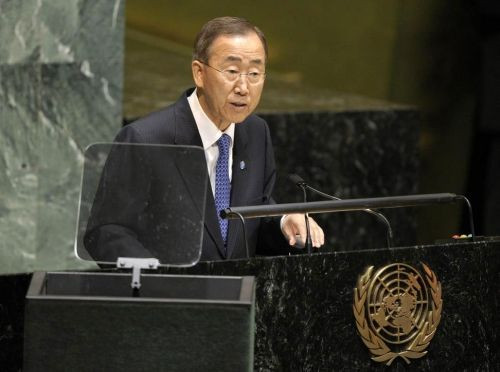UN Chief Predicts 'Massive Effort' Against Chronic Diseases

UN General Secretary Ban Ki Moon predicted a massive effort against non-communicable diseases in the years ahead at the launch of a UN health summit on Monday that aims to curb health related behavior linked to activities such as smoking, and the use of tobacco products and alcohol.
"This will be a massive effort, but I am convinced we can succeed,” he said.
The focus of the two-day high level meeting is to set up plans by 2013 that will help curb the growing burden placed on countries by cardiovascular diseases, cancers, chronic respiratory disorders and diabetes.
"The prognosis is grim. According to the World Health Organization (WHO), deaths from NCDs will increase by 17 per cent in the next decade. In Africa, that number will jump by 24 per cent.” Ban Ki Moon said.
"The impact of this loss, this tragedy, goes beyond individuals, beyond families. NCDs are altering demographics. They are stunting development. And they are impacting economic growth.”
Industries such as those which profit from selling processed foods to young children, were also being targeted.
"There is a well-documented and shameful history of certain players in industry who ignored the science, sometimes even their own research, and put public health at risk to protect their own profits,” Moon said.
He called for targets to be set by 2012 to curb mortality from these diseases, heightening interest from policy makers in snacks, drinks, and drugs, as well as ways in which tobacco use can be reduced.
The World Health Organization recently urged the implementation of such cheap measures as legislating for smoke-free workplaces to stem the rise in NCDs in developing countries.
The study challenges poor countries to implement such measures for a little as $1.20 per person per year.
Not addressing the problem over the next 15 years would cost low and middle income countries more than $7 trillion.
Preventive Measures
Measures being considered include taxes on tobacco and alcohol, smoke-free indoor workplaces and public places, health information and warnings, as well as campaigns to reduce salt content and replacement of trans fats with polyunsaturated fats, along with public awareness programs about diet an physical activity.
Other measures focus on individuals and include screening, counseling and drug therapy for people at risk of heart disease, screenings for cervical cancer and hepatitis B immunization to prevent liver cancer.
The cost of implementing the strategies in low and middle-income nations would amount to $11.4 billion a year, WHO said. The cost for population-wide efforts is about $2 billion per year while the individual-level interventions would cost $10 billion per year.
“What these studies show us is that the most basic package of prevention and control measures is affordable, even for poor countries,” said Ann Keeling, CEO of the NCD Alliance. “But the cost of not tackling these growing killers is inestimably higher than the cost of acting now.”
Economic Output Losses
Imagine how global education could benefit from the total of $47 trillion which will be lost worldwide due to heart disease and other non-communicable diseases over the next 20 years, the head of the World Economic Forum posited.
Prof. Klaus Schwab, the Chair of the World Economic Forum pondered the lost economic potential which non-communicable diseases will make on possible future educational endeavors as a new report from the WEF indicated that lost output would be 4 percent of global GDP by 2030.
“Think of what could be achieved if these resources were productively invested in an area like education,” he said.
“The need for immediate action is critical to the future of the global economy.”
Mental ill-health will cost about $16 trillion, or one third of the losses during the period, according to the WEF.
NCDs account for 60 percent of deaths worldwide annually, a total of 36 million. Eighty percent of NCD deaths happened in low and middle income countries.“Cumulative NCD losses will rise steadily over the next 20 years, but the rate of increase will pick up sharply by 2030. The value of life lost, including lost income, out-of-pocket spending related to medical care and pain and suffering due to NCDs will double between 2010 and 2030,” the report states.
Published by Medicaldaily.com



























